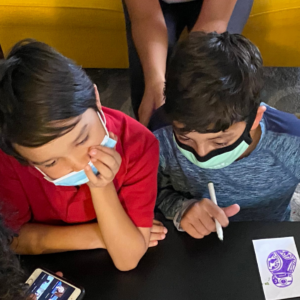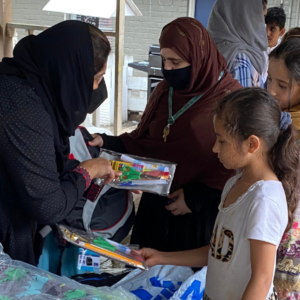CHAT: Empowering Immigrant and Refugee Communities
By Elizabeth Snell

This past October, Culture of Health–Advancing Together (CHAT) joined Mid-America Arts Alliance as a program.
CHAT has over eight years of experience working with the immigrant and refugee populations in Houston, Texas. Our joining of forces allows M-AAA to broaden our reach, expand opportunities, deepen our connections, and enrich the communities we serve.
Recently, Dr. Aisha Siddiqui, founder and director of CHAT, and M-AAA’s own DeMarcus Akeem Suggs, director of development, discussed how CHAT came to be, along with her personal and research-informed connection to the work.
In the interview below, you will get a glimpse of Dr. Siddiqui’s brilliant mind, strong passion, and dedication to the work of using the arts as a vehicle for community, health, and advocacy.
DeMarcus Akeem Suggs (DAS): Can you share why your work focuses on arts, education, advocacy, and health?
Dr. Aisha Siddiqui (AS): CHAT’s work focuses on arts, education, advocacy, and health because these areas are interconnected and essential for fostering holistic well-being and community development. Here’s why each aspect is important:
- Arts: The arts provide a powerful platform for expression, creativity, and cultural exchange. Through various art forms such as visual arts, music, dance, and theater, individuals, particularly refugee students can explore their identities, share their stories, and connect with others. Additionally, art has been shown to promote emotional healing, resilience, and mental well-being.
- Education: Education is fundamental for empowering individuals, building skills, and fostering opportunities for personal and professional growth. By providing access to quality education and educational resources, CHAT aims to equip immigrants and refugees with the knowledge, skills, and confidence needed to succeed in a diverse society.
- Advocacy: Advocacy plays a crucial role in addressing systemic barriers, promoting social justice, and amplifying the voices of marginalized communities. By advocating for policy changes, equitable access to resources, and the rights of underserved populations, CHAT strives to create a more just and inclusive society.
- Health: Health is a foundational aspect of well-being that encompasses physical, mental, and social dimensions. CHAT recognizes the importance of addressing health disparities, promoting preventive care, and ensuring access to healthcare services for immigrants, refugees, and all underserved communities. By focusing on social determinants of health into its programming, CHAT seeks to improve health outcomes and enhance overall quality of life within the communities we serve.
In summary, CHAT’s focus on arts, education, advocacy, and health reflects its commitment to addressing the multifaceted needs of immigrant and refugee communities. By leveraging the synergies between these areas, CHAT endeavors to create positive social change and foster thriving, resilient communities.

Dr. Aisha Siddiqui, founder and director of CHAT
DAS: How did you come to this work? What’s your connection to it and your background?
AS: My journey into this work began long before officially founding CHAT in 2015. It traces back to my upbringing in a society rife with social injustice and class disparities, where health disparities between the rich and poor deeply troubled me. Upon immigrating to the United States in the mid-1980s with the aim of pursuing higher education and aiding mothers and children in Pakistan, I encountered the harsh reality of health crises and disparities during my tenure as an epidemiologist at the Houston Health Department.
Motivated to address these disparities further, I pursued a doctoral program at the University of Texas School of Public Health, where I delved into understanding health inequalities, particularly among immigrants and refugees, with a focus on women and children. My personal experiences as an immigrant informed my decision to concentrate on this demographic for my dissertation work, as I witnessed firsthand the challenges they faced in adapting to their new environment.
One poignant incident that left a lasting impact on me was the arrest of a 17-year-old refugee student for driving without a license, unable to communicate in English. Witnessing his distress, compounded by his mother’s offer of a cigarette to calm him down, underscored the stark reality of health inequalities stemming from inadequate education and support systems.
Driven by the desire to address these challenges comprehensively, CHAT was founded with a multifaceted approach to target the social determinants of health among immigrants and refugees. Through initiatives like the Girls Club for Success, which integrates social-emotional learning with art-based activities, we strive to empower individuals, reduce isolation, facilitate acculturation, and connect resources to improve health and well-being.
The success of our programs, such as the unexpected participation of 44 girls in the Girls Club for Success, demonstrates the transformative power of art as a tool for self-expression, personal development, and therapeutic healing. By leveraging art and focusing on improving social and personal skills, we aim to enhance students’ self-esteem, self-confidence, and overall resilience.
In essence, my personal journey and professional experiences have shaped CHAT’s mission to address health disparities, advocate for social justice, and empower immigrant and refugee communities through innovative, culturally sensitive programs and initiatives.
DAS: I’ve had the opportunity to see your work up close and witness how personal CHAT’s mission is to you. However, I’m not sure that everyone knows the importance of research in your work. What are some things you have learned that inform your work through CHAT?
AS: Research plays a vital role in informing our work at CHAT by providing evidence-based insights, fostering cultural competence, and guiding our efforts to make a meaningful impact on the health and well-being of immigrant and refugee communities through addressing the social determinants of health. Based on my personal research, several key insights have been gained that inform our work and approach for CHAT.
- Community Needs and Priorities: Research has helped us understand the specific health disparities and challenges faced by immigrant and refugee communities. This knowledge allows us to tailor our programs and initiatives to address these pressing needs effectively.
- Cultural Sensitivity: Through research, we have provided valuable insights into the cultural nuances and sensitivities of the communities we serve. This understanding is crucial in developing culturally appropriate interventions and building trust with community members. After school programming and trained Community Health Workers (CHWs) are examples of our tailored interventions.
- Linguistic Challenges: Understanding linguistic diversity has highlighted the importance of cultural competence in our approach. We have learned to be sensitive to cultural differences in language use and communication styles, which helps build trust and rapport with community members.
- Barriers to Accessing Health Care: Research findings have highlighted the barriers that immigrant and refugee populations encounter when accessing health-care services. This knowledge guides us in developing strategies to improve access and overcome these barriers.
- Effective Outreach and Engagement Strategies: Based on research findings, we have identified effective outreach and engagement strategies that resonate with our target communities. This knowledge helps us engage community members more effectively and promote participation in our programs.
- Impact Evaluation and Program Improvement: Research contributes to our ongoing efforts in evaluating the impact of our programs and initiatives. By understanding what works well and areas for improvement, we can continuously enhance the quality and effectiveness of our work through CHAT.
Learn about M-AAA and CHAT at the 2024 Welcome Celebration Luncheon
DAS: As CHAT gets firmly settled into M-AAA’s local, regional, and national work, what are you most looking forward to?
AS: As CHAT becomes increasingly integrated into Mid-America Arts Alliance’s local, regional, and national initiatives, I am particularly excited about the prospect of expanding our reach and impact beyond our current scope. By aligning with M-AAA’s extensive network and resources, we have the unique opportunity to extend our programs and services to new regions within M-AAA’s domain.
Expanding our work into these regions presents a significant opportunity to engage with diverse communities, each with its own set of needs, challenges, and strengths. By tailoring our programs and initiatives to meet the specific needs of the underserved communities, we can deepen our impact and contribute to positive social change on a broader scale.
Moreover, venturing into new regions allows us to forge new partnerships and collaborations with local organizations, artists, and stakeholders. These partnerships can enhance our capacity to address complex social issues and leverage collective expertise and resources to create innovative solutions.
Additionally, expanding our reach into other regions of M-AAA’s jurisdiction enables us to amplify the voices and experiences of immigrant and refugee communities across a wider geographic area. By providing platforms for cultural expression, storytelling, and community engagement, we can foster greater understanding, empathy, and appreciation for the rich diversity of immigrant and refugee experiences.
Overall, I am enthusiastic about the opportunity to expand our work into new regions within Mid-America Arts Alliance’s jurisdiction. Through strategic partnerships, tailored programming, and community engagement, we can extend our impact and create positive change in communities across the regional, national, and perhaps international levels.

